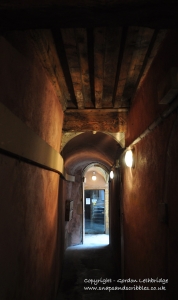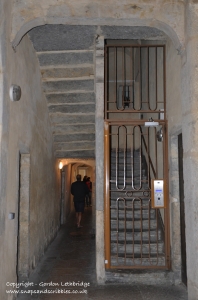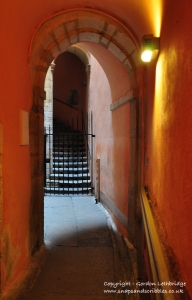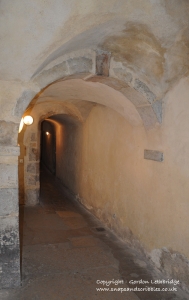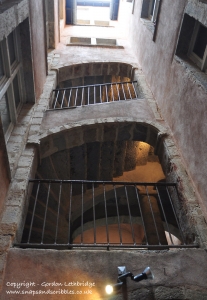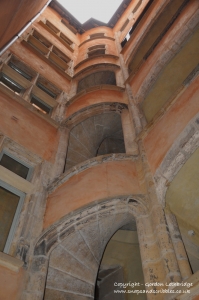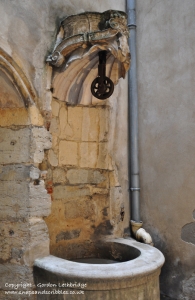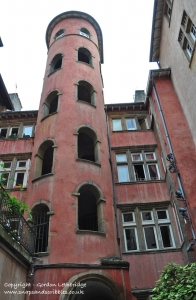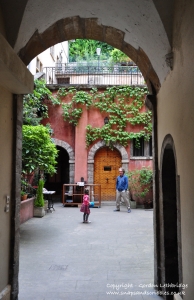Secret passages of Lyon
There was a keypad set into the stone wall of a four storey Renaissance house. Francoise pressed the “P” for porte. There was a slight hum of electronics and a barely audible click. We pushed the heavy door. It creaked as it swung inwards to reveal a poorly lit vaulted passageway. Not sure where it would lead I moved with more than a little trepidation down the passage as my eyes slowly adjusted to the dimness. Moments later I came across a barred doorway with steps leading up. We spoke in whispers, not wishing to disturb the inhabitants. Welcome to the world of traboules.
Traboule comes from the latin words trans ambulare meaning “to cross”. After the Romans left the people were forced to move from the top of the Fourviere Hill closer to the River Saone. The geography of the land meant most streets were constructed parallel to the river. The traboules are passageways through houses connecting one street with another and were constructed intitially for people to fetch water and goods from the river. As the silk trade in Lyon grew, the traboules were used to move their goods around the city easily without the inclement weather spoiling their bolts of precious cloth.
Francoise and I continued down the passage to where daylight shone. We emerged in brilliant sunshine, not onto the next street but into a courtyard of Renaissance galleries and mullions, a cover spiral staircase and in one corner a well. I would never have found such an architectural gem had Francoise not had inside knowledge. Many of the traboules open out into courtyards full of Renaissance architectural gems before continuing on to the next street.
Although a few traboules exist in a few other cities they are recognised as being fairly unique to Lyon. When the silk weavers moved to the Croix Rousse area of Lyon they incorporated traboules in the new houses. However it is in Vieux Lyon where the Renaissance courtyards are found.
After admiring the courtyard for a while we head back into the traboule following it through another house to come out on a different street in Vieux Lyon. The many tourists strolling along Rue St Jean had disappeared. This was a different street; a quieter, narrower cobbled street that ran parallel.
Traboules run through the houses which gives you the feeling of entering a private, almost secretive world. Not all are open to the public and even those that are are only discreetly indicated with a small information plaque. Many of those that are open have agreements with the city that involves restoration and maintenance work in return for the traboules remaining open during specific times.
Today the traboules mostly serve as access to private apartments. However there is one that leads to a courtyard where there are rooms to let and another where the entrance and courtyard are a luxury hotel. The longest of the traboules “La Traboule Longue” passes through several houses and small courtyards and is one of the most popular.
It is the courtyards that hold the little architectural gems. It may be a Renaissance watchtower with a spiral staircase or a balcony that would do Shakespeare’s Juliet proud had the play been set in Lyon and not Gerona. It was the Italian silk traders that influenced Lyonnais archtecture at this time and this is evident in the galleries, staircases, decorative mullions and balconies.
Not all the courtyards are constructed on such a grand scale. Some are simple; little more than a communal space, sometimes with a well and an entrance to a staircase.
Their hidden, secretive nature served the Resistance well during the Second World War. They are credited with ensuring the occupying Germans never had complete control of the city. They were also used during the weavers riots in the 1800s as a way of moving people from one location to another undetected.
Even today they are not easy to find even when marked on a map. You then you have to overcome that fear of opening an unknown doorway. It is worth persevering with your exploration as you really get under the skin of Lyon both figuratively and actually.
A 2 hour walking tour is bookable from the Lyon Tourist Office and Convention Bureau
Declaration: I visited Lyon as guest of the Lyon Tourist Office and Convention Bureau. However, as always I maintain full editorial control over the content and my opinions, positive or negative are my own.
Heading to Lyon and need a guidebook? You will find a selection of books in the Lyon section of the Travel Unpacked Shop (£)
